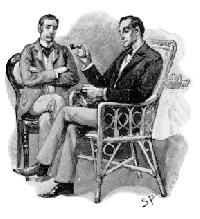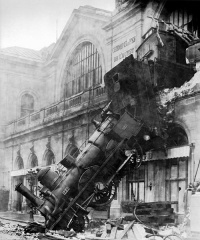Reality
From The Art and Popular Culture Encyclopedia

|
"Imaginary gardens with real toads in them [...]." --Marianne Moore "The mind of man can imagine nothing which has not really existed [...]." --Edgar Allan Poe "What is truth? A mobile army of metaphors, metonyms, and anthropomorphisms. --Friedrich Nietzsche in "On Truth and Lies in a Nonmoral Sense" |
_by_Giovanni_Paolo_Panini.jpg)

Illustration: Sherlock Holmes (right) and Dr. Watson, by Sidney Paget
|
Related e |
|
Featured: |
Reality is the state of things as they actually exist, rather than as they may appear or might be imagined. In a wider definition, reality includes everything that is and has been, whether or not it is observable or comprehensible. A still more broad definition includes everything that has existed, exists, or will exist.
Philosophers, mathematicians, and other ancient and modern thinkers, such as Aristotle, Plato, Frege, Wittgenstein, and Russell, have made a distinction between thought corresponding to reality, coherent abstractions (thoughts of things that are imaginable but not real), and that which cannot even be rationally thought. By contrast existence is often restricted solely to that which has physical existence or has a direct basis in it in the way that thoughts do in the brain.
Reality is often contrasted with what is imaginary, delusional, (only) in the mind, dreams, what is false, what is fictional, or what is abstract. At the same time, what is abstract plays a role both in everyday life and in academic research. For instance, causality, virtue, life and distributive justice are abstract concepts that can be difficult to define, but they are only rarely equalled with pure delusions. Both the existence and reality of abstractions is in dispute: one extreme position regard them as mere words, another position regard them as higher truths than less abstract concepts. This disagreement is the basis of the philosophical Problem of universals.
The truth refers to what is real, while falsity refers to what is not. Fictions are considered not real.
Etymology
From the Classical rēs (“thing”) + -ālis (suffix forming adjectives of relationship).
The 'real world'
Real world (also "real life") is generally a colloquialism for the physical reality of everyday life which everyone experiences; it is also referred to as the human condition. More specifically, the term has both context-dependent meanings, and also occurs as a proper name.
It is the realm of human experience comprising physical objects, and excluding theoretical constructs, hypotheses, artificial environments, and "virtual" worlds such as the Internet, computer simulations, or the imagination.
For example: "It's time to relocate this experiment from the laboratory into the real world."
The real world is another term for reality.
See also
- Absolute (philosophy)
- Alternate history
- Allegory of the Cave
- Anti-realism
- Authenticity
- Roland Barthes
- Consensus reality
- Counterfactual history
- Delusion
- Derealization
- Dissociation
- Dream
- Empiricism
- Existence
- External world
- Fact
- Fact and fiction
- False awakening
- Fiction
- Fictionalism
- Imagination
- Hallucination
- Hyperreality
- Illusion
- Irrealism (the arts)
- Jorge Luis Borges
- Language and thought
- Lie
- Map–territory relation
- Mental representation
- Nihilism
- Normal
- Noumenon
- Objectivity (philosophy)
- Observer effect
- Ontology
- Paranormal
- Phenomenon
- Psychosis
- Rashomon effect
- Realism
- Real world
- Reality television
- Real life
- Reification
- Representation (arts)
- Sapir-Whorf hypothesis
- Semiotics
- Simulacrum
- Simulated reality
- Skepticism
- Social constructionism
- Surrealism
- The truth of fiction
- Unreal
- Waking Life (film)



